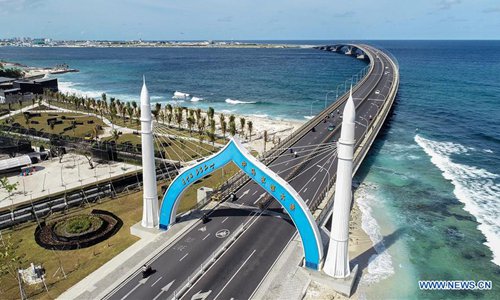
Aerial photo taken on Sept. 1, 2019 shows the China-Maldives Friendship Bridge in Maldives. The China-Maldives Friendship Bridge, the first cross-sea bridge in the Maldives built by a Chinese company connecting the Maldivian capital of Male with neighboring Hulhule Island, was inaugurated on Aug. 30, 2018 and put into use on Sept. 7, 2018. The 2-km-long bridge is an iconic project of the Maldives and China in co-building the 21st Century Maritime Silk Road. The bridge makes it possible for locals and tourists to travel between the two islands within five minutes. In one year, the bridge has brought great convenience for local people in their daily life. (Photo: Wang Mingliang/Xinhua)
China has been a dependable partner in the development of the Maldives, and there are various areas in which both sides can strengthen bilateral cooperation under the China-proposed Belt and Road Initiative (BRI), ranging from the blue economy and digital economy to green technology, as well as infrastructure, the Maldives National Chamber of Commerce & Industry (MNCCI) told the Global Times.
The remarks came after the successful conclusion of the official visit to China of President of the Maldives Mohamed Muizzu from January 8 to 12. A slew of key cooperative projects were inked, as the two countries sought to deepen bilateral cooperation for win-win outcomes.
The presidential visit was eagerly anticipated by the business community in the Maldives, particularly with regard to fostering collaboration in enhancing tourism, facilitating secure infrastructure investments, and advancing cooperation in areas such as security, trade, and global challenges, the MNCCI said.
"China has consistently proven to be a dependable partner in the development of our nation," said the chamber.
China's participation in the economic development of the island nation has been evident under the BRI. One of the most prominent examples of recent Chinese investment is the China-Maldives Friendship Bridge, the first cross-sea bridge in the Maldives built by a Chinese company.
The bridge has significantly expanded economic connectivity, presenting numerous commercial prospects. According to the MNCCI, this has not only enhanced supply chain logistics but also led to the exploration of new housing opportunities, and development of the Youth City project in Hulhumale. The housing projects undertaken by Chinese investors have also propelled the development of the Youth City to unprecedented levels, the MNCCI said.
Another example is the expansion and upgrading of Ibrahim Nasir International Airport, with the participation of Chinese companies. This enhancement has significantly improved connectivity, bolstered tourism, and potentially created new employment opportunities.
Chinese investment, particularly in critical infrastructure projects, has injected much-needed capital for overall development, addressing essential areas such as housing, renewable energy, and waste management, the Maldives industry chamber said.
There are various areas where the chamber sees potential for enhanced cooperation with China, including the blue economy, which covers marine resources such as aquaculture and fisheries. Other areas are sustainable development and tourism.
The digital economy, in which China has expertise and technology is also an area that both sides can explore, including e-commerce, fintech and digital payments, the MNCCI said.
Green technology and infrastructure could also be areas for further cooperation with win-win outcomes, including climate resilient infrastructure, waste management and recycling.
The BRI has been a pivotal in the strengthened cooperation. Looking ahead, the Maldives business chamber said that "our future aspirations hinge on prioritizing sustainability initiatives... crucially, we emphasize the importance of training Maldivians to operate and maintain BRI projects, ensuring enduring benefits and contributing to the long-term success of these endeavors."
The MNCCI also underscored the need to preserve the strategic autonomy of the Maldives and diversification of partnerships to prevent an undue reliance on any single country.

